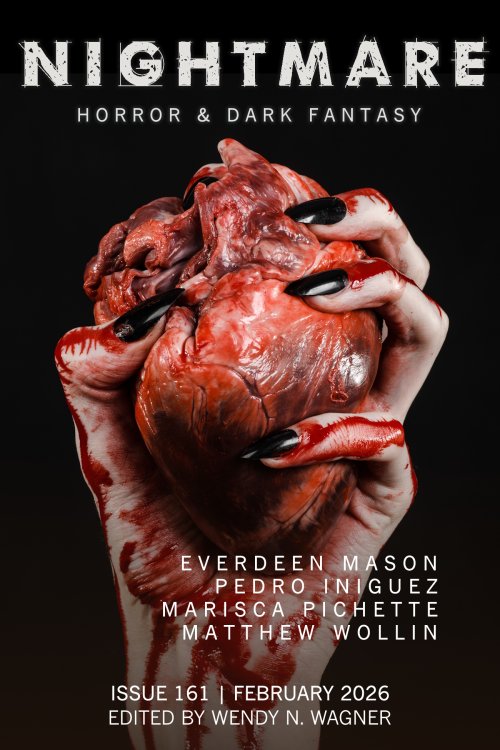To start, I want to thank you for bringing this story here to our Nightmare audience! I found it an absolutely fascinating read, and I first wanted to ask you what the original seed for Edgar Addison’s tale was?
I read Roberto Bolaño’s Nazi Literature in the Americas a while back. It collects a whole bunch of biographies about, well, you know, Nazis in literature. It’s pretty cool. I’m a big fan of Bolaño—if you haven’t read any, you should.
Anyway, after I finished it, I started thinking about the other books I’d really liked that did the same thing, like Schwob’s Imaginary Lives and Borges’ A Universal History of Infamy. Infamy is my favourite Borges book, actually. It’s probably a bit uncool to say that because he wrote so much cool stuff, but it’s the one I always go back to.
I did what most authors do when they love a thing, or a style, and I decided to nick it and write one. I could write a whole book of them, but I thought, no, just one. You got a lot to do, just write one, like a proof of concept. I told myself that if I could sell it, I’d write a book of them. I’d write my own collection of sad, terrible biographies. And so I am. I even have a title, and I never have titles, but I have a good one for it.
So, if you’re an editor or a publisher, and you read this and like it, drop me a line. I’m cheap. I only ask for millions, not billions.
In a roundabout way, this functions as a love story. Edgar would certainly have found difficulty connecting with others, yet he finds Madeleine, who is at minimum willing to meet him where he’s at. His book, Dévorer, is named for her—after all, she’s his devourer. Why is transgressive, wholly unique love like this one so compelling to us?
I guess it is because we all like to think of our love as transgressive and unique, right?
One aspect I enjoyed was the social setting of Edgar’s life. Born from nobility, but from the very start it’s mired in cruelty and disgust (William Addison’s past, his mother’s marriage to his brother, dead maids secretly buried around the lake). The Addison family as a whole is, shall we say, controversial; what were you looking to say about social hierarchy in this story?
All that stuff is just nobility and wealth, really. It seems to me if you can afford to abuse people, flout social rules, and treat people like garbage, you will.
I wasn’t really trying to say anything about social hierarchy, just presenting it as is, as it takes place around us.
In the bibliography, many of the titles of the book allude to Edgar Addison as “evil” or an “agent of despair,” but I find him to be a more complex case; his desire was never to hurt others, but to die little deaths in service of them and be present to see it, and I’m not even sure he himself qualifies as a “cannibal.” What’s your honest opinion of Edgar and his story?
Oh, he’s a cannibal. He’s just not your stereotypical crazy gay cannibal that is, I suspect, more about vilifying homosexuality than presenting anything real to people. So yeah, Edgar’s a cannibal. And beyond that, he’s just a person, neither good nor bad. He contains the potential for multitudes.
Sometimes I want for my characters to sit on that uncomfortable side of real for a reader and Edgar Addison is one of those. I want him to niggle a little, to remind you of someone, maybe. I want you to be disquieted.
Your website is called “The Urban Sprawl Project;” could you elaborate on what that means?
I once made a ’zine called The Urban Sprawl Project. It was a psychogeography ’zine, mixing text and photography. A friend and I would go ’round with disposable cameras, and another friend would lay it out for us once we had all the pictures taken and printed out. I did all the writing. We gave it out for free in the neighbourhoods we wrote about. It was pretty fun. I liked the name, so I kept the name.
I suspect it’s actually terrible from a PR/branding point of view, but that’s my style, I guess.
One of your other works, “twenty-six lies/one truth,” is an autobiography written as a set of encyclopedia entries, which of course calls the structure of this story to mind as well. What do you enjoy about playing around with the academic format in your work?
It’s just nice to do. There’s a lot of ways to write a story, and I like to write them in different ways. It’s fun.
There’s really nothing too deep about it, I’m afraid.
What do we have to look forward to from you in the future?
I just had a novella, The Red Labyrinth, released. You should go check it out. It’s dark and weird and has a big fuck off labyrinth in it.








